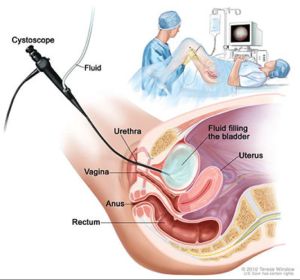What is gross hematuria?
Gross hematuria is the medical term that refers to the condition of blood in the urine that is visible to the naked eye.
This can range in severity from frank bright red thick blood with clots to very light tinged urine that is transparent and looks like light fruit punch. Blood in the urine can also be cola-colored when it is older and not a result of active bleeding.
Seeing blood in the urine is a reason for concern and definitely requires consultation with a urologist, however, the cause is not always a serious disorder.
What symptoms are associated with gross hematuria?
The symptoms associated with gross hematuria depend mainly on its cause. Blood in the urine associated with an infection or a stone can be painful, whereas gross hematuria associated with a small bleeding bladder tumor may cause no pain at all. It is important that you make an appointment to see a urologist with any degree of blood in the urine whether it is associated with symptoms or not and whether or not it has resolved on its own.
What are the causes of gross hematuria?
Blood in the urine can come from anywhere within the male or female urinary tract from the kidneys down to the bladder and urethra in women and including the prostate in men.
Urinary Tract Infections

Urinary Tract Infections (UTIs) can occur as a result of bacteria entering the urinary tract. Once the bacteria enter, they can divide and multiply in the bladder causing cystitis or the kidneys causing pyelonephritis. Symptoms associated with a urinary tract infection include urinary frequency and urgency, pain or burning with urination, foul-smelling urine, possibly fever, and of course gross hematuria. Pyelonephritis may additionally be associated with flank pain and is a more severe urinary tract infection.
Kidney or Bladder Stones
In the context of certain metabolic conditions, disease states, or urinary stasis, crystals in the urinary tract can aggregate and form stones in the kidneys, ureters or bladder. Stones are painless when they are not obstructing the ureter or bladder outlet, but can cause significant pain when they cause obstruction of the urine down the ureter. When stones rub against the gentle inner mucosal lining of the kidneys, ureters, or bladder it can cause gross or microscopic hematuria.
Enlarged Prostate or BPH
The prostate gland is only present in men and is located just beyond the bladder where urine begins to empty out. The prostate is a donut-shaped organ that forms part of the proximal urethra encircling it and causing obstruction and blockage when it becomes enlarged. As the prostate compresses the urethra, it becomes more and more difficult for the bladder to squeeze the urine out leading to symptoms in men such as waking up at night to urinate, frequency, urgency, urinary incontinence, urinary tract infections, hydronephrosis, bladder stones, kidney injury and/or gross or microscopic hematuria.
Kidney Disease
Microscopic or gross hematuria can occur as a result of certain medical disease states associated with the kidney. Glomerulonephritis can cause gross or microscopic hematuria. It is a disease characterized by inflammation of the glomeruli, the microscopic organelles within the kidney that filter blood from the capillaries. Glomerulonephritis is a broad term and can occur as a result of many conditions such as diabetes, viral or bacterial infections, blood vessel disease or vasculitis, immunological diseases such as IgA nephropathy, and more.
Cancer
Gross or microscopic hematuria can occur secondary to bleeding from cancer of the inner lining of the bladder, ureters, or kidneys known as transitional cell carcinoma. In fact, hematuria is the most common presenting symptom or sign in patients with bladder cancer. When kidney cancer arising from the kidney itself, known as renal cell carcinoma, becomes advanced it can cause hematuria as well. Prostate cancer can cause hematuria as well, but it is not a typical presenting sign or symptom.
Inherited Disorders
Sickle cell anemia, a disease affecting hemoglobin in red blood cells can cause hematuria. Alport's syndrome, a condition affecting the glomeruli in the kidney can cause hematuria too.
Kidney or Bladder Injury
Any traumatic event whether penetrating or blunt can cause gross or microscopic hematuria. Hematuria in the context of trauma is potentially associated with a serious injury and should be evaluated thoroughly by a urologist.
Medications
Certain medications can cause gross or microscopic hematuria. An anti-cancer medication called cyclophosphamide and even penicillin has been associated with hematuria. All antiplatelet and anticoagulant agents such as aspirin, Plavix, coumadin, and elliquis can increase the risk for hematuria but are not and explanation by themselves. Hematuria associated with medical therapy requires a thorough workup as well.
Exercise-Induced Hematuria

Although not common, with strenuous exercise a small proportion of individuals will begin to see blood in the urine. The exact etiology is unclear, but it may be related to trauma to the bladder or dehydration. It is important not to presume that hematuria associated with exercise is benign. Any amount of gross hematuria or significant microscopic hematuria requires a full workup by a urologist typically consisting of a cystoscopic evaluation, a CT scan with and without IV contrast, and urine cytology.
What risk factors are associated with gross hematuria?
Anyone can have blood in the urine. Risk factors for hematuria include the same risk factors associated with the conditions that cause the hematuria. Increased age, male gender, and history of smoking increase the concern for malignancy as the cause for hematuria. Patients with any amount of gross hematuria or that meet the AUA definition of microscopic hematuria require a full workup.
What tests are used to work up a patient with gross hematuria?
Cystoscopy

Work up with cystoscopy for hematuria is typically done in the urologist's office. A small, narrow flexible camera is placed into the urethra, through the prostate channel in men, and into the bladder under visual guidance. The bladder mucosal surface can be fully evaluated with cystoscopy. Conditions such as bladder tumors, bladder stones, cystitis, and prostate bleeding in men can be clearly seen.
Imaging Studies
Depending on the degree of severity and the risk factors of a patient, a renal ultrasound, CT scan, or MRI is used. A gold standard initial test would be a CT scan with and without IV contrast with delayed images to highlight the ureters. Nearly all surgical conditions not seen on cystoscopy associated with gross hematuria can be diagnosed with this test.
Urine Studies
A urinalysis can be helpful for quantifying the number of red blood cells in the event of microscopic hematuria. Urinalysis is also helpful in diagnosing a urinary tract infection and even diabetes that may be contributing to the condition associated with hematuria. Urine cytology and FISH tests also help the urologist determine if there are cancerous cells in the urine that need further evaluation.
Physical Exam
A physical exam is part of the workup for any disease state. Physical exam in the context of hematuria can reveal costovertebral angle tenderness associated with a passing stone or pyelonephritis. A distended palpable bladder can be associated with BPH or enlarged prostate. A thorough medical history is also of critical importance.
What is the treatment for gross hematuria?
The treatment for blood in the urine of course depends fully on the cause. A urologist will make recommendations for treatment based on the findings of the workup outlined above.
At Urological Consultants of Florida, our board-certified urologists specialize in the management of gross and microscopic hematuria and have extensive experience in the diagnosis and treatment of the conditions that cause hematuria.
Request Your Consultation Today!
To request your consultation, please call (305) 575-2771 or contact us online today!
Our Locations
12411 Biscayne Boulevard
North Miami, FL 33181
Phone: (305) 575-2771
Get Directions







